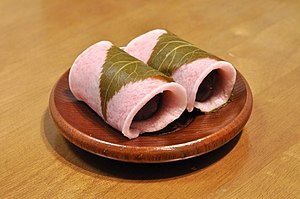
In Japan, desserts were being made for centuries well before sugar was made widely available. Many desserts commonly available in Japan can be traced back for hundreds of years.[1] In Japanese cuisine, traditional sweets are known as wagashi, and are made using ingredients such as red bean paste and mochi. Though many desserts and sweets date back to the Edo period (1603–1867) and Meiji period (1868–1911), many modern-day sweets and desserts originating from Japan also exist.
However, the definition of wagashi is ambiguous, and the line between wagashi and other types of Japanese confectionery is vague. For example, although the original kasutera (castella) was introduced from Portugal, it has been around for more than 400 years and has been modified to suit Japanese tastes, so it is classified as a wagashi.[2][3][4] The raindrop cake, created in 2014, was developed by a wagashi shop as a derivative of shingen mochi and is recognized as a wagashi in Japan.[5][6] In recent years, wagashi shop have developed and marketed many confections that are an eclectic mix of wagashi and Western confections, often referred to as "neo-wagashi".[7]
Japanese desserts[edit]

- Anpan
- Chinsuko
- Coffee jelly
- Green tea ice cream
- Hakuto jelly
- Melonpan
- Mochi ice cream[8]
- Purin
- Sata andagi
- Tokyo banana
-
Hakuto jelly is a seasonal dessert in Japanese cuisine available in the summer.
-
Mochi ice cream is a Japanese confection made from mochi (pounded sticky rice) with an ice cream filling.
Wagashi[edit]


Wagashi (和菓子) is a traditional Japanese confectionery which is often served with tea, especially the types made of mochi, anko (azuki bean paste), and fruits. Wagashi is typically made from plant ingredients.[9] Wagashi are made in a wide variety of shapes and consistencies and with diverse ingredients and preparation methods. Wagashi are popular throughout Japan and each region has its own specialties, but many products are regional or seasonal.[10]
Types of wagashi[edit]
A[edit]
B[edit]
C[edit]
D[edit]
G[edit]
H[edit]
I[edit]
K[edit]
M[edit]
N[edit]
R[edit]
S[edit]
- Sakuramochi
- Senbei
- Shiruko (red bean soup)
- Suama
T[edit]
U[edit]
W[edit]
Y[edit]
Gallery[edit]
-
Daifuku is a glutinous rice cake stuffed with sweet filling, most commonly anko, sweetened red bean paste made from azuki beans.
-
Dango is a dumpling and sweet made from mochiko (rice flour), related to mochi. It is often served with green tea.
-
Higashi is dry and contains very little moisture, and thus keeps relatively longer than other kinds of wagashi.
-
Arare is a type of bite-sized Japanese cracker made from glutinous rice and flavored with soy sauce. Sweet and savory varieties are prepared.
-
Hanabiramochi is a Japanese sweet usually eaten at the beginning of the year.
-
Monaka is prepared with azuki bean jam filling sandwiched between two thin crisp wafers made from mochi.
-
Namagashi are a type of wagashi, which is a general term for snacks used in the Japanese tea ceremony. Namagashi may contain fruit jellies, other gelatines such as Kanten or sweetened bean paste.
-
Tokoroten is prepared with jelly extracted from seaweeds such as tengusa (Gelidiaceae) and ogonori (Gracilaria) by boiling. Pressed against a device, jelly is shaped into noodles.
-
Warabimochi is a jelly-like confection made from bracken starch and covered or dipped in kinako (sweet toasted soybean flour).
-
Assorted yatsuhashi. The flavors, from top to bottom, are tofu, cinnamon, sesame.
Brands[edit]
See also[edit]
Japanese sweets and desserts[edit]
Related topics[edit]
References[edit]
- ^ 38 Japanese Desserts. (n.d.). Retrieved from https://www.japan-talk.com/jt/new/japanese-desserts
- ^ a b その2和菓子の種類 (in Japanese). Japan Wagashi Association. Archived from the original on 16 February 2024. Retrieved 22 February 2024.
- ^ a b 駆け足でたどる和菓子の歴史 (in Japanese). National Diet Library. Archived from the original on 22 February 2024. Retrieved 22 February 2024.
- ^ その1和菓子の歴史 (in Japanese). Japan Wagashi Association. Archived from the original on 22 February 2024. Retrieved 22 February 2024.
- ^ "賞味期限がたったの30分! 山梨でしか味わえない絶品「水信玄餅」は事前準備をしっかりして挑むべし!". Rocket news 24. 23 June 2021. Archived from the original on 28 February 2023. Retrieved 23 February 2024.
- ^ "「ネオ和菓子」脚光、小豆高騰". The Nikkei. 27 April 2023. Archived from the original on 26 April 2023. Retrieved 24 February 2024.
- ^ Watanabe, Teresa (2012-11-07). "Frances Hashimoto dies at 69; Little Tokyo leader, mochi ice cream creator". Los Angeles Times. Retrieved 2012-12-02.
- ^ Gordenker, Alice, "So What the Heck is That?: Wagashi", Japan Times, 20 January 2011, p. 11.
- ^ (n.d.). Retrieved from https://www.japan-guide.com/e/e2312.html
- ^ 榮太樓 和菓子屋のあんみつ 抹茶みつ
- ^ 和菓子屋の角カップあんみつ黒糖
- ^ 今川焼き 生地や中身にこだわり、飽きない和菓子 (in Japanese). Nikkei. 24 April 2014. Archived from the original on 22 June 2017. Retrieved 24 February 2024.
- ^ 関東は今川焼、関西は大判焼き等・・・生地に餡入れて焼き上げたアレ 全国に100以上名前あった (in Japanese). Tokai Television. 29 May 2022. Archived from the original on 5 June 2023. Retrieved 24 February 2024.
- ^ もみじまんじゅう(廿日市市宮島町) (in Japanese). Hiroshima Prefecture. 12 July 2022. Archived from the original on 9 November 2022. Retrieved 22 February 2024.
- ^ "ういろう" [Uirō]. Dijitaru daijisen (in Japanese). Tokyo: Shogakukan. 2012. OCLC 56431036. Archived from the original on 2007-08-25. Retrieved 2012-06-24.
External links[edit]
 Media related to Confectionery of Japan at Wikimedia Commons
Media related to Confectionery of Japan at Wikimedia Commons Media related to Sweet food of Japan at Wikimedia Commons
Media related to Sweet food of Japan at Wikimedia Commons Media related to Wagashi at Wikimedia Commons
Media related to Wagashi at Wikimedia Commons
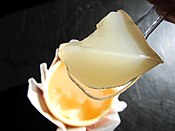



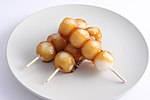
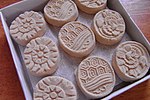









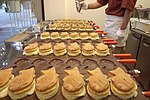
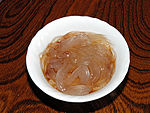
![Uirō is a traditional Japanese steamed cake made of rice flour and sugar.[16]](https://upload.wikimedia.org/wikipedia/commons/thumb/c/cc/CodazziUiro1.jpg/150px-CodazziUiro1.jpg)



